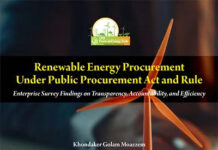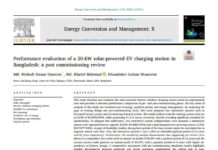 While Bangladesh’s energy scenario has been historically dominated by natural gas assuming that Bangladesh will never face a shortage in natural gas production, the local natural gas production started decreasing after 2016 and is likely to decrease even more in the coming years. Increasing demand for gas and decreasing local production led Bangladesh to import Liquefied Natural Gas (LNG) in 2018. Power plants account for the major share of the gas consumed in Bangladesh. This study estimates the economic costs of the LNG supply chain considering the power plant as an end customer in Bangladesh for the fiscal years 2019 to 2021. A supply chain was identified to estimate the economic costs of LNG in Bangladesh based on the data collected from relevant government agencies. It was found that per unit LNG import cost, was about 24 times that of the national company production. Environmental emissions associated with the imported LNG were also estimated in the study based on literature. LNG life cycle emissions indicate that LNG is not that of improvement from other fossil fuels. The study concludes that to meet the existing gas demand of Bangladesh currently there are no alternatives to LNG import, but, considering LNG as a long-term solution going to cost the country gravely.
While Bangladesh’s energy scenario has been historically dominated by natural gas assuming that Bangladesh will never face a shortage in natural gas production, the local natural gas production started decreasing after 2016 and is likely to decrease even more in the coming years. Increasing demand for gas and decreasing local production led Bangladesh to import Liquefied Natural Gas (LNG) in 2018. Power plants account for the major share of the gas consumed in Bangladesh. This study estimates the economic costs of the LNG supply chain considering the power plant as an end customer in Bangladesh for the fiscal years 2019 to 2021. A supply chain was identified to estimate the economic costs of LNG in Bangladesh based on the data collected from relevant government agencies. It was found that per unit LNG import cost, was about 24 times that of the national company production. Environmental emissions associated with the imported LNG were also estimated in the study based on literature. LNG life cycle emissions indicate that LNG is not that of improvement from other fossil fuels. The study concludes that to meet the existing gas demand of Bangladesh currently there are no alternatives to LNG import, but, considering LNG as a long-term solution going to cost the country gravely.
Keywords: Liquefied Natural Gas (LNG), economic costs, import, environmental emissions, gas scenario, life cycle emissions, supply chain
Authors: Khondaker Golam Moazzem, Abdullah Fahad and Shah Md. Ahsan Habib
Publication Period: June 2022




![Currents of Change [Volume-3, Brief-02] Quarterly Brief of the Power & Energy Sector of Bangladesh](https://cpd-power-energy-study.com/wp-content/uploads/2026/02/Quarterly-Brief-of-Power-Energy-Sector-of-Bangladesh-3-cover-218x150.jpeg)



